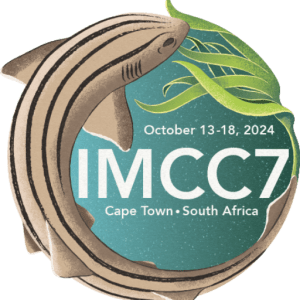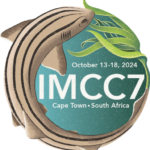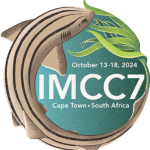IMCC Symposia Lineup
IMCC 7 is set to host over 40 symposia! Abstract submissions for both open and closed symposia are now being accepted. Before submitting your abstract, please note that symposia come in two distinct types:
Closed Symposia: These sessions are by invitation only, requiring presenters to obtain permission from the symposium lead before submitting an abstract to the symposium.
Open Symposia: Anyone may request to present as part of an open symposium, and symposium leads will select those that best fit their needs. If you are not accepted into an open symposium, your talk will be placed into another session type.
Submitting Your Abstract
To submit your abstract, please follow the “Submit an Abstract” link located in the right panel to access the abstract submission site.
CLOSED SYMPOSIA
To present during a closed symposium, you must have already been in discussion with a symposium lead.
- Understanding Human-Ocean connections and values: Actioning the UN Ocean Decade
- OECMs: Opportunities for expanding marine protection in South Africa
- Equity Waves: Navigating Blue Justice for Sustainable Seas
- How to better centre ocean equity in marine science
- Finding consensus areas for protection on the high seas
- Using expected outcomes of Marine Protected Areas to inform and improve biodiversity conservation: Assessments using The MPA Guide
- A panel discussion on the status of the Southern Benguela marine ecosystem – what is really going on in this once highly productive ecosystem?
- Beyond Funding: Rising to the challenges of supporting actionable ocean science
- Indigenous-led Ocean Conservation on Canada’s Pacific Coast – the Great Bear Sea MPA Network (Part One – Overview / Part Two – Implementing the Network
- Building the scientific case for high seas marine protected areas
OPEN SYMPOSIA
Anyone may request to present as part of an open symposium, and symposium leads will select those that best fit their needs. If you are not accepted into an open symposium, your talk will be placed into another session type.
- Seas of Sustainability: Advancing Marine Stewardship in the Indian Subcontinent
- Citizen Science for Marine Conservation
- A Conceptualization of Illegal, Unreported, and Unregulated (IUU) Fishing Across Spatiotemporal Scales
- Beyond the status quo: defining and enabling a sustainable blue economy and stewardship in the deep ocean
- Using marine biodiversity knowledge to inform conservation action – Progress from national assessments
- Sustained Engagement Across Scientists, Managers, and Communities is Essential to Foster Climate-Resilient Fisheries
- Exploring Nature Positive Pathways for Marine Conservation
- Learning about Ocean Defenders through Global Case Studies
- Improving Effectiveness of Marine Protected Areas with SMART and other integrated conservation technology
- A better resilient future: Join us on the coast of innovation as we explore the synergy between Ecosystem-Based Adaptation, Marine Protected Areas, and Coastal Communities
- Building Partnerships for Climate-Resilient MPAs
- Science-Based Targets for Ocean Industries: Establishing the science to engage corporate action on ocean conservation
- Progress, barriers, and opportunities to achieving the 30×30 target in the Western Indian Ocean
- Transboundary threats and conservation of sea turtles
- Visions for an integrated marine science community
- Tangible actions to tackle marine pollution
- Facilitating dialogue in support of Small-Scale Fishers in the western Indian Ocean region
- Successful examples of estuarine restoration: Science-based strategies and hope for the future
- Beyond “30×30”
- Marine conservation conflict in coastal metropoles
- The use of earth observation for marine and coastal conservation and decision support
- Ocean Fluency in the Western Indian Ocean: Experiences and Practicalities from Kenya and South Africa
- Empowering Oceans: Building Conservation Capacities in Developing Nations
- Oceans for all: Open symposium on DEI in ocean practice
- Putting sharks in the parks: sharing lessons in spatial planning to accelerate shark conservation
- Charting a Course for Collaborative Interdisciplinary Innovation in Marine Conservation and Stewardship
- Creating a community-led marine plan in western, Newfoundland Canada to protect and connect the health of our ocean and coastal communities
- From base pair to genome: current applications for marine conservation
- Methods and approaches for Nature and People Positive Oceans
The 7th International Marine Conservation Congress
OCTOBER 13-18, 2024
CAPE TOWN, SOUTH AFRICA



